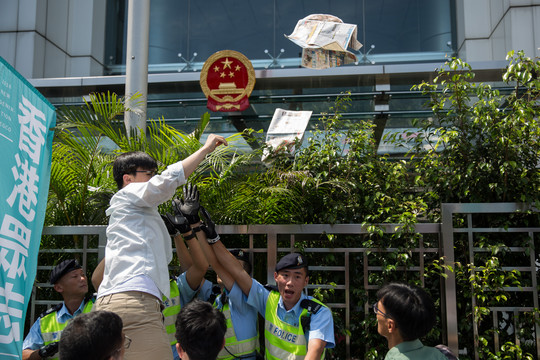The International Federation of Journalists today releases its China Press Freedom Report 2016, Strangling the Media: China Tightens its Grip. Launched at the Foreign Correspondents Club in Hong Kong, the report is the IFJ’s annual analysis of the state of media freedom in Mainland China, Hong Kong and Macau. It is produced under the IFJ’s China Press Freedom project, now in its ninth year, which works to support and defend media independence in the region.
The report documents the challenges faced by local and foreign journalists, writers, publishers, bloggers, citizen journalists and other media workers. For the second time, the report includes the IFJ’s assessment of the number of journalist and media workers detained and jailed in China. It documents 68 cases, the earliest dating back to 2008.
The IFJ said: “The most worrying developments were the willingness of several Hong Kong media outlets to publicize forced confessions in return for favoured access to detainees, and the apparent abduction of a media worker by Chinese security agents operating in Hong Kong.
“The media’s cooperation with the Chinese authorities was a gross betrayal of professional ethics that eroded confidence in its commitment to acting as an independent check on power. The disappearances of media workers outside China, as well as on the Mainland, caused grave concern among the people of Hong Kong in general.
“As in previous years, the Chinese authorities used unjust laws, arbitrary rules, detention without trial, secret interrogations, televised ‘confessions’, propaganda, restrictive orders, censorship, surveillance, internet controls, expulsion, intimidation, detention of family members, and physical assault to silence the media on the Mainland. In Hong Kong, the authorities used the civil courts, unfair regulations, and the commercial power of advertising to stifle expression and reduce media diversity.”
Key findings highlighted in the report include:
Abductions and forced confessions: In early 2016, five missing people from Causeway Bay Bookstore and Mighty Current Media publishing in Hong Kong “reappeared” in detention in China. The five media workers had disappeared in late 2015, including one who appeared to have been abducted from Hong Kong territory and taken into the Mainland in secret. Shockingly, several Hong Kong media outlets accepted the Chinese authorities’ offer to do “exclusive” interviews in which the detainees “confessed” to a variety of “crimes”. The interviews were tightly controlled and the journalists did not report on the detainees’ whereabouts or physical condition. The outlets’ willingness to act as propaganda mouthpieces showed they had surrendered their responsibility to report honestly and defend the public’s right to know.
Diversity reduced: In early 2016,China’s President Xi Jinping announced: “All Party media have the surname Party.” Communist Party and government-controlled media slavishly followed the official line. Commercial media on the Mainland struggled to do independent reporting. The authorities took over, suspended or shut down several prestigious Mainland media outlets that had provided a special “space” for discussion of sensitive topics, including liberalisation and reform. Through a combination of online controls and offline police actions, they also stifled discussion online and silenced a group of opinion-leading bloggers known as “Big Vs”.
Foreign journalists:Ursula Gauthier, Beijing correspondent for French news magazine L’Obs, was forced to leave China on 31 December 2015, after her press card was not renewed. The government accused Gauthier of “offending” the Chinese people in a column about the violence-racked Special Autonomous Region of Xinjiang. Although the issue of working visas improved, correspondents continued to struggle with surveillance and interference in the field.
The IFJ said: “Strangling the Media: China Tightens its Grip focuses on the pressure on media freedom in the region, but also highlights the tenacious fight by some media workers to defend the public’s right to know. The IFJ applauds and supports the efforts of the media to report accurately and fairly on events and to give expression to the authentic voices of China.”
Access Strangling the Media: China Tightens its Grip in English and Traditional Chinese.
See IFJ mapping of violations of media rights in China here.
For further information contact IFJ Asia-Pacific on +61 2 9333 0946
The IFJ represents more than 600,000 journalists in 140 countries
Find the IFJ on Twitter: @ifjasiapacific
Find the IFJ on Facebook: www.facebook.com/IFJAsiaPacific

